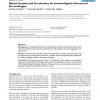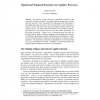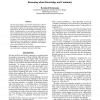213 search results - page 10 / 43 » Using Spatial Language in Multi-Modal Knowledge Capture |
125
click to vote
BMCBI
2007
15 years 2 months ago
2007
Background: An adequate and expressive ontological representation of biological organisms and their parts requires formal reasoning mechanisms for their relations of physical aggr...
102
click to vote
BIRTHDAY
1997
Springer
15 years 6 months ago
1997
Springer
The structures of space and time are identified as essential for the realization of cognitive systems. It is suggested that the omnipresence of space and time may have been respons...
130
Voted
BMCBI
2007
15 years 2 months ago
2007
The bio-ontology community falls into two camps: first we have biology domain experts, who actually hold the knowledge we wish to capture in ontologies; second, we have ontology s...
113
click to vote
FLAIRS
2006
15 years 3 months ago
2006
The aim of this paper is to extend the modal logic of knowledge due to Moss and Parikh by state transformers arising, eg, from actions of agents. The peculiarity of Moss and Parik...
124
click to vote
WCE
2007
15 years 3 months ago
2007
—This paper is concerned with the application of a conversational agent and expert system to provide a natural language interface to a database. Typically, natural language datab...



